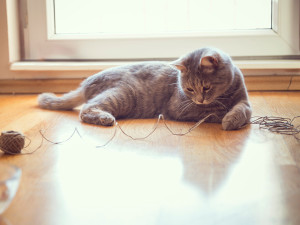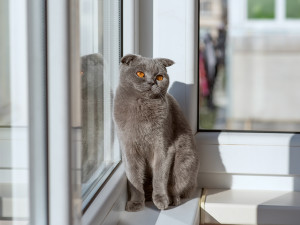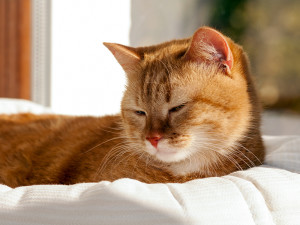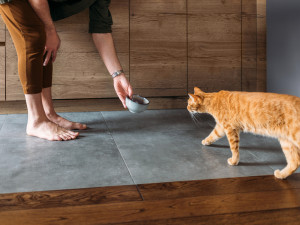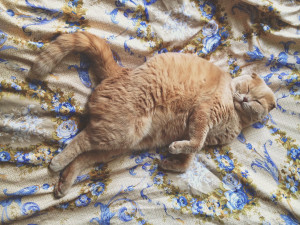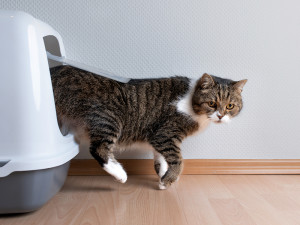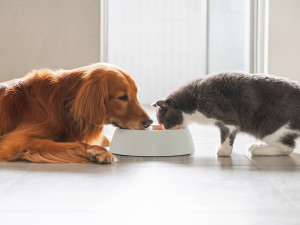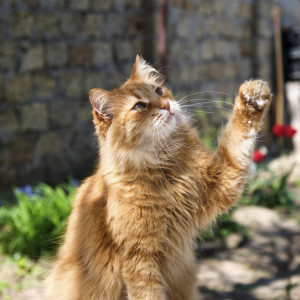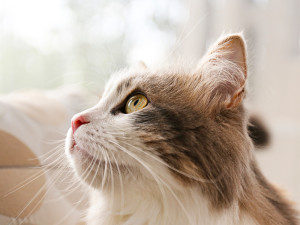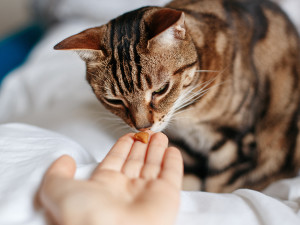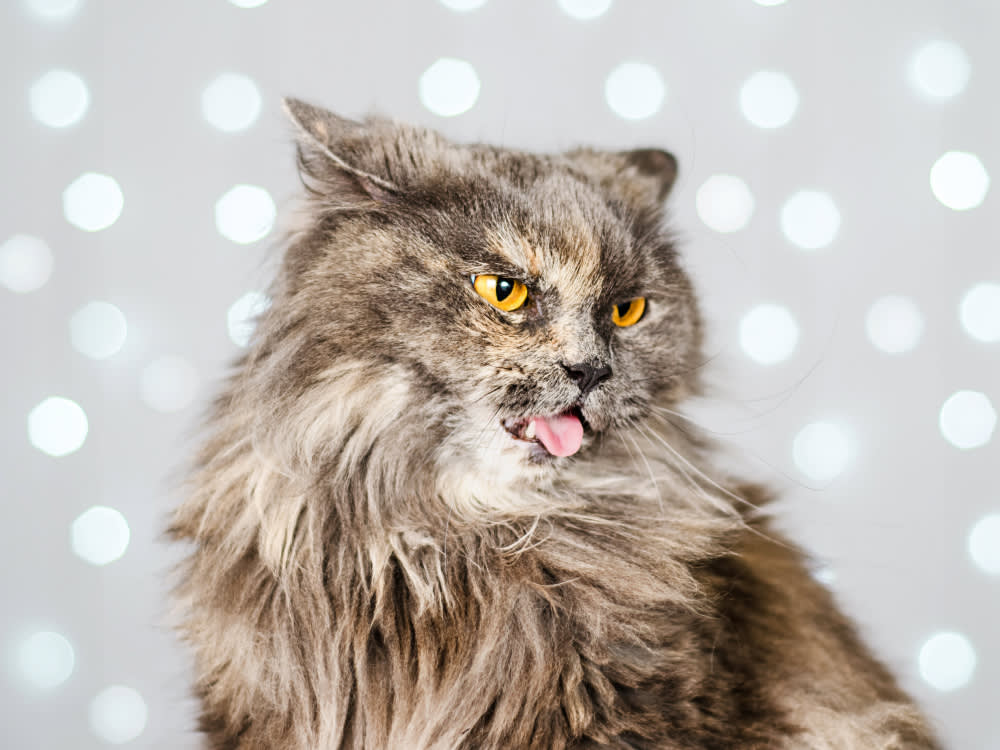
Share Article
In This Article:
Vomiting or Regurgitation? Common Causes of Vomiting from Within the Gut Common Causes of Vomiting from Outside the Gut How to Determine the Cause of Your Cat’s Vomiting When to Visit a Vet for Excessive Vomiting How Is Excessive Vomiting in Cats Treated?
OK, your cat threw up again. Your first thought is probably, “Ew, gross.” But your second thought might be, “Oh, no; what’s happening?” While you can typically pinpoint what caused you to hurl (tequila shots, bad sushi, or, oh, God — seeing someone else throw up), diagnosing your cat isn’t so simple.
Sometimes, it was just a case of cat nausea, and a bout of vomiting did the trick. No biggie. Other times, it’s the first sign of a serious issue. Knowing what health concerns could be to blame is a good start to figuring out why your cat keeps throwing up.
Vomiting or regurgitation?
The first step is to determine if your cat is vomiting or regurgitating. Vomiting is active: the forceful expulsion of stomach contents, usually accompanied by retching and abdominal contractions. You know what this looks like. Regurgitation, on the other hand, is passive: stomach contents come out without warning. Picture a silence broken by a sudden, disgusting splat. These are two different symptoms with different underlying causes that either originate inside or outside the GI tract.

Common causes of vomiting from within the gut
GI obstruction
Gastrointestinal foreign bodies are a common cause of vomitingopens in new tab. When a cat ingests foreign material, that object must make it past the stomach and through the intestines before coming out the other end. If it gets stuck at any point along the way, your cat will vomit it back up. Dogs who regularly ingest toys, rocks, socks (the list goes on) are all at risk for developing obstructions. Cats aren’t innocent either. Yarn, shoelaces, and hair ties are common causes of obstructions in cats. Tumors in the GI tract can also block the passage of food and lead to similar signs. Kitty-proofing your home can help prevent these emergency situations.
Rotten or toxic food
Scavenging for rotten food out of the trash, eating toxic table scraps, or hunting rodents can all lead to inflammation of the GI tract, also known as gastroenteritis. Ingestion of toxic substances such as household chemicals, medications, or plants can also cause cat nausea.
Food intolerance or inflammatory bowel disease (IBD)
Cats with food intolerance or allergies can develop vomiting if the food contains ingredients that their gut can’t tolerate. This can lead to chronic inflammation in the GI tract. You may need to switch up your cat’s diet to find something that they can tolerate.
Ulcers
Gastric ulcers from toxins, tumors, or kidney disease can also cause vomiting. If your cat is vomiting blood (or vomit that contains dark specks of digested blood), that could be the first sign of an ulcer.
Hairballs
Cat-hairball vomiting is very common and can be a result of normal self-grooming habits, especially in long-haired cats.
Infections or infestations
Vomiting is a common symptom in kittens who have intestinal parasites or viral infections. Parasites such as roundworms, hookworms, or coccidia can cause gastrointestinal upset, leading to vomiting. Viral or bacterial infections such as feline panleukopenia (feline distemper) or feline viral rhinotracheitis, can also trigger vomiting episodes in kittens.
Common causes of vomiting from outside the gut
Pancreatitis
The pancreas is an organ located near the stomach that releases digestive enzymes. It can become inflamed after ingesting fatty foods, with diet change, or sometimes for no good reason. Pancreatitis can lead to vomiting, anorexia, and abdominal pain.
Organ dysfunction
Kidney or liver disease can lead to nausea, poor appetite, and vomiting. Kidney disease can develop if your cat ingests something toxic (e.g. antifreeze, grapes, NSAIDs, or lilies), or has a UTI, urinary obstruction, or chronic degeneration. Toxin ingestion, inflammation/cirrhosis, infection, and gall bladder obstruction are some common causes of liver disease.
Endocrine disease
When endocrine diseases, such as diabetes mellitus or hyperthyroidism, go undiagnosed or poorly regulated, vomiting can be the result of the severe metabolic shifts involved.
Infection
Female cats who are not spayed can develop serious uterine infections (called pyometras) that can lead to vomiting, abdominal pain, and vaginal discharge.
Feeding behavior
Certain behaviors like eating too much too fast can cause meals to come back up as fast as they went down. If your cat tries to inhale an entire meal in one bite, there are tactics available to slow them down such cat puzzle feeders. And if you find yourself googling, “Why is my cat throwing up bile?” your cat’s picky eating habits could be to blame. Going too long between meals can lead to your cat vomiting bile.
How to determine the cause of your cat’s vomiting
Determining the cause of your cat’s vomiting can be a bit like solving a mystery. Start by observing the frequency, timing, and appearance of the vomit. Is it happening after meals, or is it more sporadic? Is the vomit clear, foamy, or does it contain undigested food? Consider any recent changes in diet, environment, or behavior. These clues can help narrow down the potential causes.
At the end of the day, diagnosing the exact cause of your cat’s vomiting often requires a veterinary examination, including a physical assessment and possibly diagnostic tests. So, if your cat’s vomiting persists or is accompanied by other concerning symptoms, don’t hesitate to talk to give your vet a call.
Is my cat’s throwing up normal?
The reality is, an occasional puking episode can be considered normal for cats under certain circumstances. Cats are known to have sensitive stomachs, and they may vomit occasionally due to factors such as dietary indiscretion, hairballs, or even stress. But it’s essential to differentiate between occasional, isolated incidents of vomiting and more concerning patterns of vomiting.
What is the difference between acute and chronic vomiting?
Understanding the difference between acute and chronic vomiting in cats can help determine whether the behavior is normal or requires medical attention. Acute vomiting is a sudden onset of vomiting that typically resolves within a short period, often occurring sporadically. This type of vomiting may be triggered by diet, stress, or minor gastrointestinal disturbances. While occasional acute vomiting may not be cause for concern, recurrent episodes or the presence of other symptoms warrant a visit to the vet.
On the other hand, chronic vomiting in cats is when we see persistent or recurrent episodes of vomiting over an extended period, usually spanning weeks to months. Chronic vomiting can be indicative of underlying health issues such as gastrointestinal disorders, inflammatory conditions, organ dysfunction, or even systemic diseases. Unlike acute vomiting, chronic vomiting requires thorough diagnostic investigation to identify the underlying cause and develop an appropriate treatment plan.
When to visit a vet for excessive cat vomiting
Typically, if your cat has vomited one to three times and displays normal behavior otherwise, the situation may not require immediate veterinary attention. But if your cat vomits more than three times and exhibits additional symptoms, it's crucial to seek veterinary care promptly. These symptoms may include:
Repeated projectile vomiting
Blood in vomit
Difficulty urinating
Loss of appetite or thirst
Unusual lethargy
Abnormal vocalizations
Diarrhea
Rapid or labored breathing
Signs of discomfort
Signs of dehydration
Pale gums
If you suspect your cat ate a foreign object or encountered toxins, it��’s essential to consult your vet immediately. Early intervention can help make sure your feline friend receives appropriate treatment and care.
What you can expect from your vet
As you can see, even this list of the most common reasons why cats can vomit is extensive, so it’s important for your veterinarian to gather as much information as possible to ensure that major health issues are caught as soon as possible. Be prepared to answer questions about your pet so they can get a better sense of the most likely cause of your cat’s vomiting and recommend the most appropriate treatment.
Does your cat still want to eat?
Can they hold down water?
How soon after eating or drinking does the vomiting occur?
What does the vomit look like?
Are they acting normally otherwise?
Does your cat like to eat or chew on inappropriate objects (even if you haven’t witnessed anything recently)?
You should be prepared to have some tests performed. X-rays are used to rule out intestinal obstruction and can sometimes reveal abdominal tumors. A blood test can screen for organ function issues or evidence of an infection. It can also reveal the secondary effects of vomiting and clue your vet into how aggressively your cat should be treated. Multiple episodes of vomiting can lead to severe dehydration that may require IV fluid therapy.
If your kitten is vomiting, your vet will probably start with a parvo test and fecal exam. If these initial tests don’t point to a clear cause, then an abdominal ultrasound may be the next step. And depending on the diagnosis, your vet could recommend outpatient care, oral or injectable medications, fluids, hospitalization, or even surgical intervention.
How is excessive vomiting in cats treated?
When a cat vomits excessively, treatment by a veterinarian may involve a few different approaches depending on the underlying cause and severity.
Outpatient care: This often begins with a thorough examination and diagnostic testing to determine the cause of the vomiting.
Oral or injectable medications: These may be prescribed to address specific issues such as inflammation, infection, or gastrointestinal upset.
Fluids: In cases of dehydration or electrolyte imbalance, fluids may be administered either orally or intravenously to restore hydration and balance.
Hospitalization: In severe cases where hospitalization is necessary, cats may receive intensive monitoring, intravenous fluids, and additional supportive care.
Surgical intervention: This may be required in certain instances, such as the removal of foreign objects or the correction of anatomical abnormalities contributing to the vomiting.
Treatment plans are tailored to each individual cat’s needs, with the goal of alleviating symptoms, addressing the underlying cause, and promoting recovery.
Home remedies for vomiting in cats
Based on your veterinarian’s diagnosis and recommendations, there may be some ways to treat your cat’s vomiting at home:
If your cat has been vomiting for less than 24 hours and there are no other symptoms:
Withhold food for 12 hours (four to six hours for young kittens) to allow the stomach to rest.
After fasting, feed a bland diet such as boiled white meat chicken and rice in small, frequent meals (about six times per day).
Transition back to their usual diet over one to two days after two to three days of the bland diet (24 hours for young kittens).
Consider adding a probiotic for cats to help balance the gut.
Ensure regular preventative treatment for parasites as advised by your vet.
If your cat is regurgitating soon after eating: Feed smaller meals or use a slow feeder to prevent eating too quickly.
If food is causing vomiting: Transition to a new diet gradually over five to seven days by mixing small amounts of the new food with the previous diet and gradually increasing the amount of new food.
FAQs (People also ask):
When should I be concerned about my cat throwing up?
If your cat is vomiting frequently, experiencing other signs of illness such as lethargy or loss of appetite, or if the vomit contains blood, foreign objects, or unusual substances, it's important to seek veterinary attention ASAP. Persistent or recurrent vomiting can indicate underlying health issues that require evaluation and treatment by a veterinarian.
What does concerning cat vomit look like?
Concerning cat vomit may vary in appearance depending on the underlying cause. Signs that warrant veterinary attention include vomit that is frequent, projectile, contains blood or foreign objects, or has an unusual odor or color. Vomiting accompanied by other symptoms such as lethargy, diarrhea, abdominal pain, or difficulty breathing may indicate a more serious underlying condition. If your cat is vomiting persistently or if there are changes in the frequency or pattern of vomiting, it's essential to consult with a veterinarian.
Why does my cat keep throwing up after eating?
There are several potential reasons why a cat may vomit after eating. Common causes include dietary indiscretion, such as eating too quickly or consuming inappropriate or spoiled food, which can lead to gastrointestinal upset. Food allergies or intolerances may also trigger vomiting in some cats.
If your cat continues to vomit after eating or shows other concerning symptoms, it’s best to consult with a veterinarian for a thorough evaluation.
References:

Jodi Helmer
Jodi Helmer is a North Carolina-based freelance writer who shares her home with an embarrassing number of rescue dogs and relies on four feral cats to patrol the barn. When she isn’t refilling food and water dishes, Jodi writes about animals for Scientific American, Sierra, WebMD, AKC Family Dog, Living the Country Life, and Out Here.
Related articles
![cat coming out of litter box]()
What to Do When Your Cat Refuses to Be (Litter) Boxed In
An expert explains why kitties are so particular about where they pop a squat.
![A dog and a cat eating from the same food dish.]()
Help Your Chonky Pet Lose Weight
This National Pet Obesity Awareness Day, here are pro tips to help make sure your pet isn’t packing on too many pounds.
Your Cat Is Limping. Now What?
When it’s no big deal and when you should worry.
![Gray and white striped cat is scratching his ear]()
What’s Up With My Cat’s Skin?
Everything you need to know about cat allergies, according to three veterinary dermatologists.
![Portrait of siberian cat with green eyes by the window.]()
How to Prevent—or Treat—Cat Ear Infections
How to prevent an ear infection (and treat one if it’s too late).
![cat being offered a treat or vitamin]()
The Best Supplements and Vitamins for Cat Health
Not your mama’s multivitamin.

